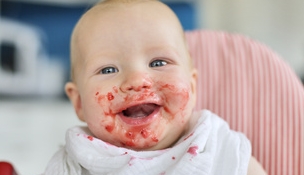
The American Academy of Pediatrics recommends that babies be exclusively breastfed for the first six months of life. A baby's digestive system is immature, and giving solids before a baby is ready can be harmful. Some signs that a baby is ready to start solids include: good head control and the ability to sit up with support; the ability to move food from the front of the mouth to the back; and following the spoon or fork with his or her eyes when you eat.
Newborn to Six MonthsUntil they are six months old, babies should be fed breast milk or formula. Adding cereal to a bottle is unsafe and could throw off the balance of a baby's digestive system, causing fussiness and other issues. After four months, if a baby shows signs that he or she is ready to eat solids, talk to your pediatrician about introducing food.
Six Months to One YearA baby's first food may consist of baby cereal, such as rice or oat cereal, or a pureed mild fruit or vegetable, such as banana or avocado. The food should be blended with plenty of liquid so it is thin and easy to swallow. Begin by feeding your baby a few teaspoons, and gradually increase the amount given as your baby gets older. Never force your baby to eat, and stop feeding your baby when he or she shows signs of being full. You can continue to add new foods every five to seven days as long as your baby does not show signs of an adverse reaction. You can add texture and finger foods as your baby gets used to eating and begins to develop a pincer grasp, but keep food pieces smaller than a pea. Most pediatricians recommend that you refrain from giving your baby highly allergenic foods like seafood and peanuts until after he or she is a year old.
One Year and BeyondAfter children are 12 months old, they can eat most of the same food that you eat. Do not give a child younger than three popcorn, raw carrots, whole grapes or nuts, because these foods may pose a choking hazard. Be creative and let your child sample foods from your plate. Introduce a variety of flavors, colors and textures, and remember to give your child plenty of fruits and vegetables, whole grains and healthy fats.
There is no need to rush when introducing solids to babies. During the first year of life, solids simply give children the chance to explore tastes and textures. Giving children a variety of healthy foods and having them join you for meals can help them develop healthy eating habits for life.
What else can I help you with?
How does the CERELAC food stages relates to the baby's age?
Hello, my baby is 6months can start cerelac to eat in which falvour can i eat
What are the release dates for The Food Nanny - 2010 Baby Steps to Dinner Time 1-8?
The Food Nanny - 2010 Baby Steps to Dinner Time 1-8 was released on: USA: 25 March 2010
Why do parents get so happy with baby's first steps?
First steps mark an important stage in child development.Apart from the obvious physical advancement, the child is now much more independent and can reach and see higher objects.Read more about child development stages at:child-development-stages
Are there stages in a sugar gliders life when the diet should be different?
when they are VERY young they drink mamas milk, then when their done drinking milk they can eat softer food like baby food, then they eat fruit and vegies and eat baby food as a treat : )
What are the steps of a diagnostic test?
There are three steps of a diagnostic test that are divided into three distinct stages. The three distinct stages are the PreStep, the RunStep, and the PostStep.
Is the baby food diet an efficient way to lose weight?
yes the baby food diet is a decent diet. it is a way to cut out processed foods, one of the most important steps in any diet plan. baby foods are usually straight food without the additives you get from normal canned food.
What is the steps of garneshee order?
what are the stages of garnishee order
How are steps in the sensorimotor stage divided?
The steps to the Sensorimotor stages are divided by months/age of the child
What are the life stages of dragonflie?
baby and adult
What are the stages of a dragonflys life?
baby and adult
What is the name of the stages of a food chain?
a food web
What are the four stages of the document work-flow process?
This includes four stages/steps: capture, manage, store, and deliver.
